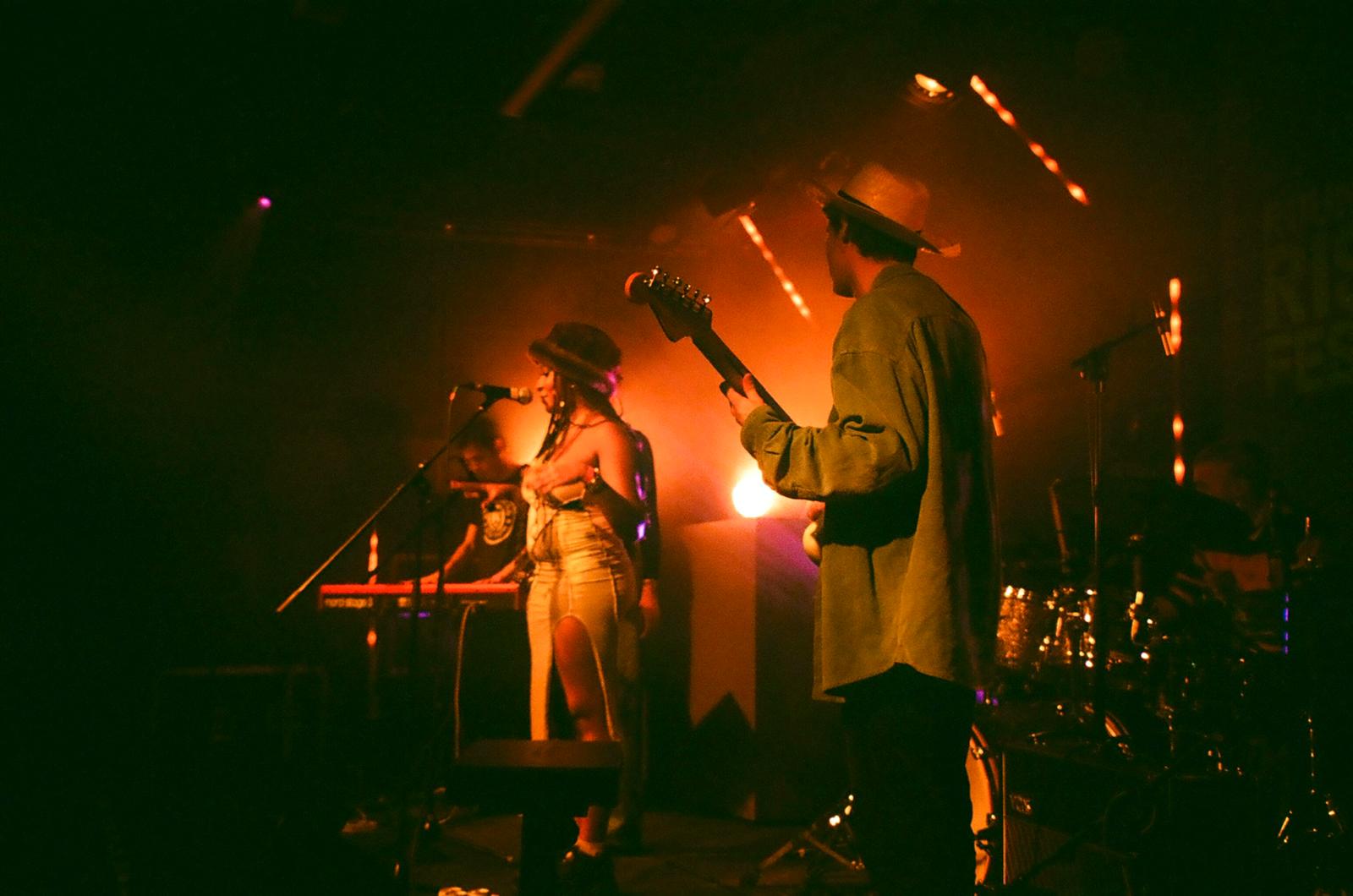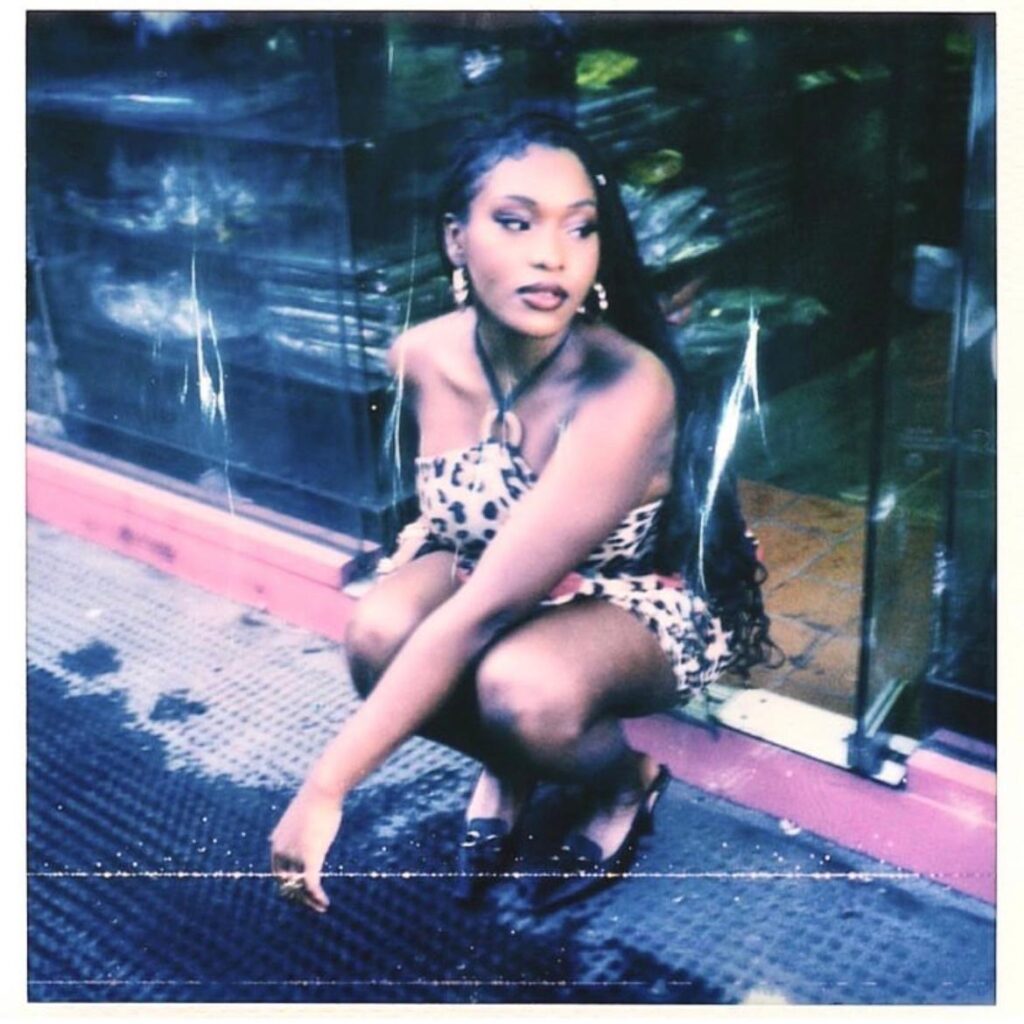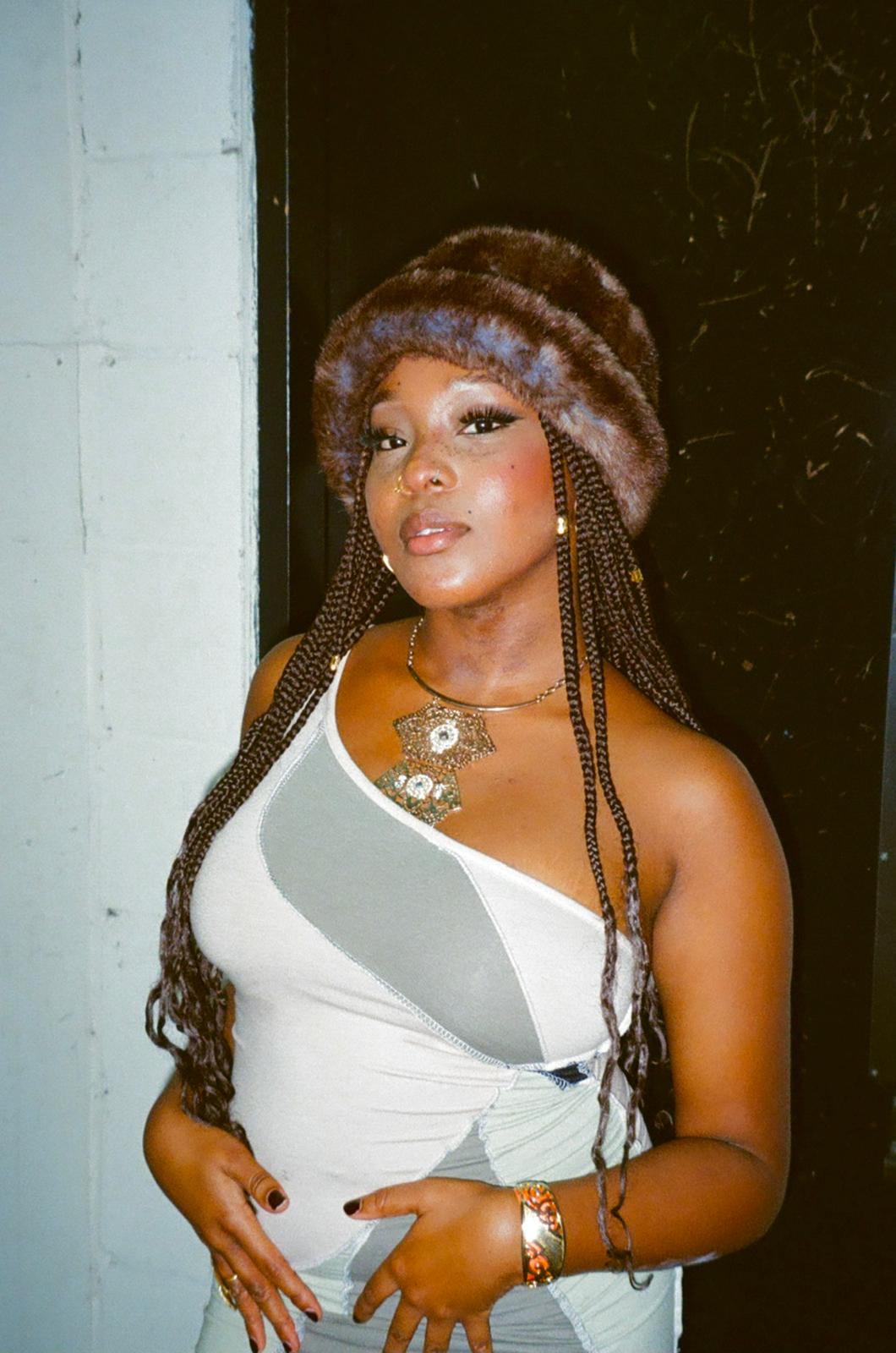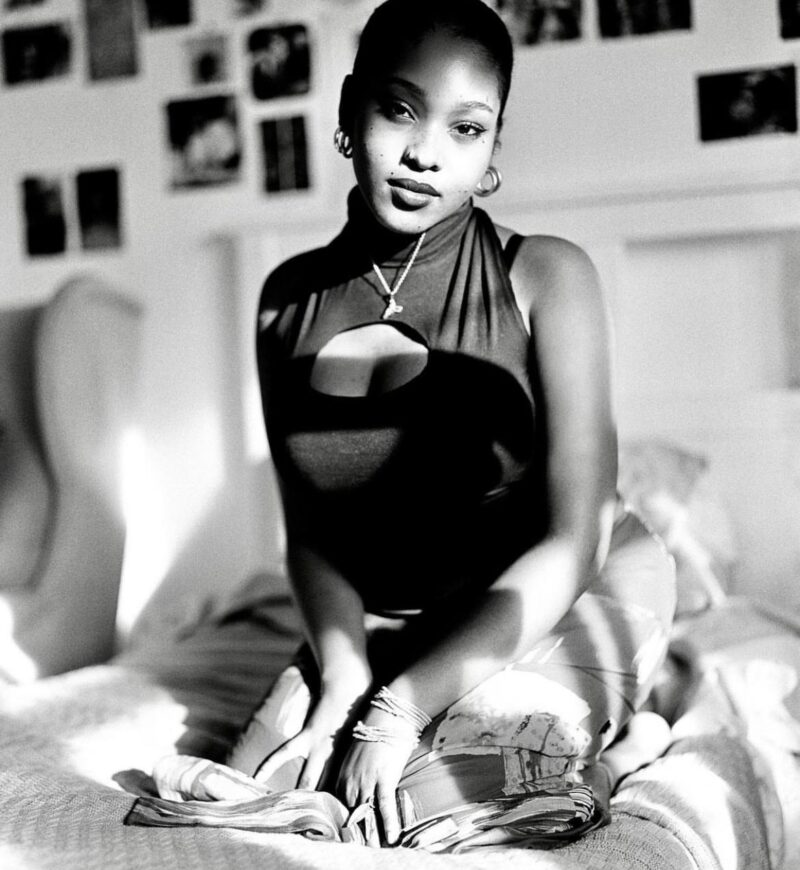KIMI ZARATE-SMITH interviews Natanya Popoola.
Natanya is an old friend. I have always admired her considered creative practice, the way in which she is inspired by her environment and her friends: her talent as a musician facilitates a constant spewing-out of creativity, her honesty brings out a sense of vulnerability that is far from conceited, and her proximity to the subjects of her works are given the due opportunity to blossom in her live performances.
Sonically, Natanya’s songs are rich and soulful. Lyrically, they are tender and meaningful: poetry about heartache, empathy, yearning, and reckoning with adult life dazzle over gracious chord progressions and soothing beats.
We caught up after Orii Jam at Colour Factory, a weekly, community-centred celebration of soul and jazz music.
Did anything in particular lead to you pursue music? Who inspired you early on, and now?
I grew up in quite a musical home. I had a father who was obsessed with Motown and Stevie Wonder, and a mother who was obsessed with funk from the 80s. There was a sense of ‘old’ music growing up around the house. I’ve always geared myself to search for interesting music without it coming straight to me – it’s always been my special interest so, when I discovered Logic, I found a method through which to harness the power from that interest and create something out of it.
These inspirations definitely stayed put as musical foundations; I still listen to Motown, old soul, jazz and funk. Recently I’ve been getting into Cleo Soul, quite soft Solange-esque music. I’ve also been listening to some kind of hybrid indie music, which I never really got deep into until now. I’ve always been a kind of hip-hop, RnB kind of person.
Where is your music situated in terms of genre — do you find yourself sticking to neo-soul, jazz, RnB, or are you more inclined to transcend genre and create a sound that isn’t specific or categorised?
I would call myself a soul musician, but I don’t think of my music as particularly defined by a genre. I have such an eclectic pool of influences to choose from. It gets to a point where I could dip into something more soulesque, or a bit more indie and tap into that flow. I don’t like to be bound by genre, which a lot of Black artists are – I think it’s important to dip your toe into as many sounds as possible so that people don’t box you in.

How do you ensure that your music stays purposeful?
I always try to express exactly what I’m feeling. With people on TikTok or social media, you find people writing songs to copy attitudes that are popular at that time. Like things to do with the pandemic, or writing songs to fit into trends — jungle has been coming up as a TikTok trend recently, people write jungle songs for the purpose of sharing them and going viral.
No matter what sound I choose, it’s always to do with something very personal, deep and gravitational within my life. It’s a very personal way to share the depths of myself with the world so that they listen. That’s how I ensure my music stays purposeful and keeps in line with the people who inspire me: if I was to show a song to Stevie or Marvin Gaye, would they rate it?
Who, then, is your music for? Do you view yourself speaking to an audience?
My music is for me! Obviously, I love the fact that people listen, but the reason why I released music in the first place is so that on the way back from school I could listen to projects I made at lunchtime. That’s why I started uploading songs on Soundcloud – it was nothing to do with an audience. When I’m writing and making music, I’m literally trying to tell the story of my life in my head in real-time.
I’m communicating feelings of confusion, of growing up and being an adult, learning how to hold my own, discussing family, spiritual growth, relationships with people, and love. That’s the shit that I’m trying to send out to the world.
Your lyrics have a realness about them, what you said about ‘real-time’ rings true. There’s a sense of introspection, of story-telling, and an urge to actualise these feelings into song. How do you go about your writing process?
My writing is very personal. When I look back on my songs, it’s a lot of ‘I’ and ‘you’ and ‘me’. I treat writing a song like a diary entry, or a poem. In the future, I want to push myself to write songs from more abstract perspectives. Like Frank Ocean, for example, in songs like ‘Super Rich Kids’ or ‘Sweet Life’ – he’s assuming a character, living inside the mind of a kid who has never experienced struggle.
When I start writing a song, usually I’ll get vocal ideas and start flowing over chords and beats. Sometimes I’ll just mumble things I feel in the moment, and it’ll come out in a melody that I fill out with words. I think my writing process is incredibly quick because I’m just getting out the first thing in my head. I also want to try writing with more depth and intention in the future. I know I get some depth with what I come up with anyway, but I think it would be nice to explore the act of intentionally sitting down and creating an art piece with the words you put on paper.

When you are performing, do you lose touch with the vulnerability of your music or the intimacy of the bedroom or studio? Or does it facilitate your ability to communicate and create a connection with the listeners?
Performance for me is my favourite part of music. I’m from a jazz background, therefore the whole concept of performance was so deeply rooted in my relationship with music. I never feel shy or locked off when I’m performing, it’s almost the opposite. Rehearsals are tiring, but once you’re there, singing, it’s so beautiful. At jams, it’s cool to have your beats and sing over a PA system, but there is something deep, spiritual and otherworldly about singing with a live band. You can’t replicate it anywhere else.
Though not central to your work as an artist, is there anything beneficial, or maybe disadvantageous, about management, labels, and the music industry as a whole in this current landscape?
The concept of management as an artist is daunting. A third party has to validate a lot of the decisions for you. It fluctuates, in the same way my relationship with music can change overnight. There were times when people found me. There were times when I needed a bit of a push career-wise, so I’d seek out managers. The managers I have now are knowledgeable and great people. They found me, after hearing my song on a Spotify Discover Weekly playlist, and said they’d love to manage me. I thought their vision was great, and now we’re working together.
Are there virtues to being unsigned, and is self-releasing something you want to stick to?
I don’t dream of staying as an independent artist necessarily. What I want is creative control over what I release. Being nineteen, I’m learning so much about myself. As I speak now, there are so many realisations that affect the way I write, sing, the way I create, and approach music in general.
Being unsigned gives you a lot of creative freedom. If you go to a major label as no one and you beg them to give you a chance, and they somehow decide that they will, they’ll take a lot of your money and they’ll create something out of you when really you should be creating something out of yourself first. It’s important to show labels that there are people who would love to hear what you are bringing out musically and that your music is worth something. At this point, being unsigned allows me to do this so that at a later point, I can still make the music I want to make, if I’m signed or not. I can express myself, and the label can be like, ‘oh yeah, I get you’, because everyone else fucks with it too.
I want that creative freedom for right now, so being unsigned works for me. But in ten years, I don’t want to have fallen in love with this art, but never passed this level. I want to be someone. The way the industry works right now, in terms of deciding what makes a musician popular, is out of touch. In the mega-label industry, everything sounds the same. That’s another reason why I want to hold back a little bit – I want to allow people to expose themselves to new sounds first.
Where does your comfort zone start and end in terms of popularity?
Maybe because I’m a neurodivergent person, the idea of a fanbase doesn’t bother me. I have had people recognise me, I wouldn’t call them a fan, but rather someone who has heard my music somewhere. It’s nice to hear people know you and respect you even though they’ve never really ever gotten the chance to interact with you properly.
I see that in the modern day and age, there’s a big sense of these para-social relationships that musicians have with their listeners. Seeing someone at Kanye’s level and the way that everyone has an eye into his life and mental state is scary. He doesn’t have the freedom to express himself the way that normal people do. That’s not something I could do, I’m very candid with the way I feel. I want to talk this way for as long as I can. I know it gets to a point that things you feel are not allowed to be on the main stage.

What is important about your environment?
Honestly, if it wasn’t for London, I wouldn’t be making and releasing music. Growing up here has given me so many opportunities: I could turn the fact that I was just a primary school kid playing the piano into something life-defining. When I was fourteen, I found out about a jazz school called the Julian Joseph Jazz Academy, and that is where I made my first music friends, where I met David (Akin Soul), where I met an amazing saxophonist, Kaidi Akinnibi.
From there on I met some of the people who are my closest collaborators to this day, Jkarri, Osquello, Dochi, IZCO, Angel Seka, Nia Archives, the list goes on. There are so many beautiful things happening here musically, and one of the greatest things about being in this city is that the alternative scene has a real sense of family, community and a yearning for growth through your art. It encourages you to keep creating even when you’re stressed, even when life’s a bit crap, it encourages you to keep on because everyone else keeps on too. It helps you understand how you can DIY stuff. If I didn’t have this close-knit group of friends, I wouldn’t know how to set up a music video or release my music. It was very vital and instrumental to the person I am today.
Are there any dream venues, or audience members that you’d like to share your music with?
I’m not too sure if I have any dream venues, anywhere that I can play liveI’m thankful for. One day I would love to see Tyler, The Creator, Solange, Pharrell, or Kelis in the audience watching me and appreciating what I’m doing. Or, my favourite producer, 9th Wonder. One day I hope Cleo Soul and Inflo come to my show and appreciate the sounds. I would love to meet Earl Sweatshirt one day. Or D’Angelo. I went to a MIKE show a few weeks back, it would be lovely to have him come to a show of mine. That’s where I’m at right now. People that make real music, fucking with my music.
Find Natanya on Spotify and Instagram.
Featured image: Photo by Connie Swift.





